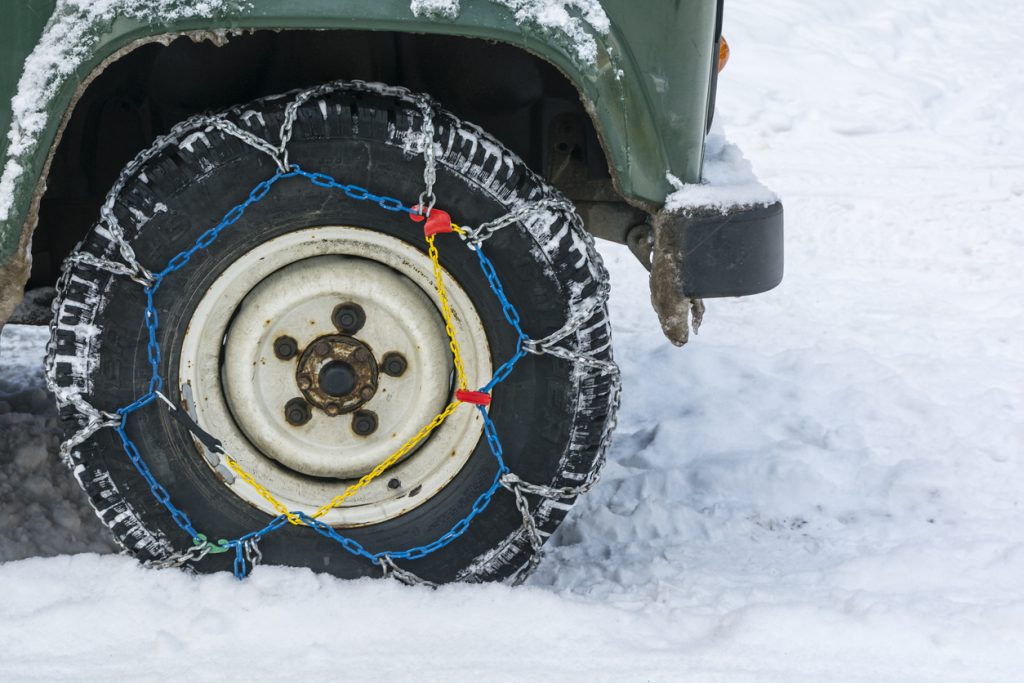
It’s wintertime, and that means Colorado’s chain laws are in effect. By state law, commercial trucks with a gross vehicle weight over 16,000 pounds must carry chains or approved alternate traction devices with them on specified roads from September 1 through May 31. However, a recent law that went into effect on August 7, 2024 has expanded the requirements associated with Colorado’s chain laws. The following overview will provide you with all the information you need to know.
In addition to knowing what is required, it is imperative that you have all the equipment and tools needed for your drivers to put the chains on when required. (This will prevent the need for an emergency road call to avoid a fine) If you are unsure about what is required, contact Mobile Wrench to have one of our mobile diesel mechanics come to your site to inspect and install anything that is needed on your semi or diesel truck and trailer.
Expanded Area Covered by Colorado’s Chain Laws
Before the new law went into effect, chains were only required on I-70 between Dotsero (exit 133) and Morrison (exit 259). However, the August 7 law expanded chain requirements to include the following roads:
- I-70 west of Morrison (mile marker 259)
- Colorado Hwy 9 from Frisco to Fairplay (mile marker 63 to mile marker 97)
- Route 40 west of Empire (mile marker 256)
- US Route 50 west of Salida (mile marker 225)
- US Route 160 west of Morrison (mile marker 250)
- US Route 550 from the state line south of Durango to Montrose (mile marker 0 to mile marker 130)
Additional Provisions of Colorado’s Chain Laws
Colorado’s chain laws require all commercial trucks to carry a chain holder and chains consisting of two circular metal loops, one on each side of the tire, connected by a minimum of 9 evenly spaced chain loops across the tread. These items need to be installed by a qualified diesel mechanic or truck technician.
There are two different levels of chain laws that can be invoked based on the specific weather conditions encountered:
- Chain Law Level 1 (Code 17) – All single drive axle combination commercial vehicles are required to chain all four drive wheels, and cables aren’t allowed as alternative traction devices. All other commercial vehicles are required to have snow tires or chains.
- Chain Law Level 2 (Code 18) – All commercial vehicles are required to use chains. Single drive axle combination and tandem drive axle commercial vehicles are required to use chains on four drive wheels. Auto transporters must comply with these requirements as much as possible without placing hydraulic lines at risk of damage. Buses must use chains on two drive wheels.
Code 17 requirements are used when there is snow covering any part of the traveled portion of pavement on an ascending grade. Code 18 requirements are used when snow is covering the entire traveled portion of pavement on an ascending grade, or when driving conditions require the use of chains to minimize road closures and protect the safety of other drivers.
Fines for failing to comply with chain law requirements include:
- Minimum of $100 for not carrying chains
- Minimum of $500 for not chaining up
- Minimum of $1,000 for blocking the highway as a result of not chaining up
In addition, the new law has imposed lane restrictions for commercial vehicles. Commercial trucks can no longer use the left lane in the following areas:
- Glenwood Canyon
- Dowd Junction (the section of I-70 between Vail and Avon)
- West side of Vail Pass
- The tunnel grade on both sides of the Eisenhower-Johnson tunnels
- Georgetown Hill
- Floyd Hill
Exceptions to Chain Law Requirements
There are several exceptions to the chain law requirements in Colorado:
- Auto transporters with hydraulic lines that could be damaged by tire chains aren’t required to have chains on all four tires, but they must be equipped with snow tires (minimum tread depth of 3/16”) or an approved alternative traction device to proceed.
- Vehicles carrying flammable, combustible or explosive cargo are allowed to chain up as early as possible when the traction of the vehicle is compromised, once the pavement is covered by snow, at a safe location.
- If the chain-up area is full or unavailable, commercial truck drivers may proceed to the next safe location to chain up.
- Trailers aren’t required to have chains on their tires.
Vehicles that meet the criteria for these exceptions must still comply with the overall chain law requirements regarding the equipment they must carry in their vehicle.
What Types of Alternate Traction Devices Are Approved in Colorado?
The following types of alternate traction devices are approved for use on commercial trucks:
- Tire Socks – Fabric-based traction devices that are a quarter of the weight of tire chains and a lot easier to install
- Tire Cables – Cables must have high-strength steel cross member rollers 0.415” or greater in diameter
- Wheel Sanders – These devices must carry enough sand to get the vehicle through the restricted area
- Auto Chains – These spin under the drive wheels automatically as traction is lost
The specific traction device equipment allowed to be used varies based on the type of commercial vehicle you’re driving:
- Straight Trucks – 4 tire chains, 4 tire socks, 4 tire cables, auto chains, or sanders
- Single Drive Axle Combinations – 4 tire chains, 4 tire socks, auto chains or sanders
- Tandem Drive Axle Combinations – 4 tire chains, 4 tire socks, 4 tire cables, auto chains, or sanders (note: tire socks and tire cables can’t be used together)
- Auto Transporters – 4 tire chains, 4 tire socks, 4 tire cables, auto chains, or sanders (note: alternative traction devices should be used instead of chains if chain use places hydraulic lines at risk of damage)
- Buses – 2 tire chains, 2 tire cables, 2 tire socks, auto chains, or sanders
Mobile Wrench Can Help You Remain Compliant with Colorado’s Chain Laws
If you own a fleet of commercial trucks that travel through the mountains of Colorado between September and May, it’s critical to comply with these chain laws in order to avoid costly fines that can derail your profitability. At Mobile Wrench, we can help ensure you remain compliant with all chain laws. Our team of mobile diesel mechanics will come to your site to install all required equipment, eliminating the hassles of bringing your trucks to a shop and minimizing downtime associated with installing this equipment.
Contact us today to schedule an appointment. Mobile Wrench serves commercial fleets in the Denver metro area, Northern Colorado and Colorado Springs.
